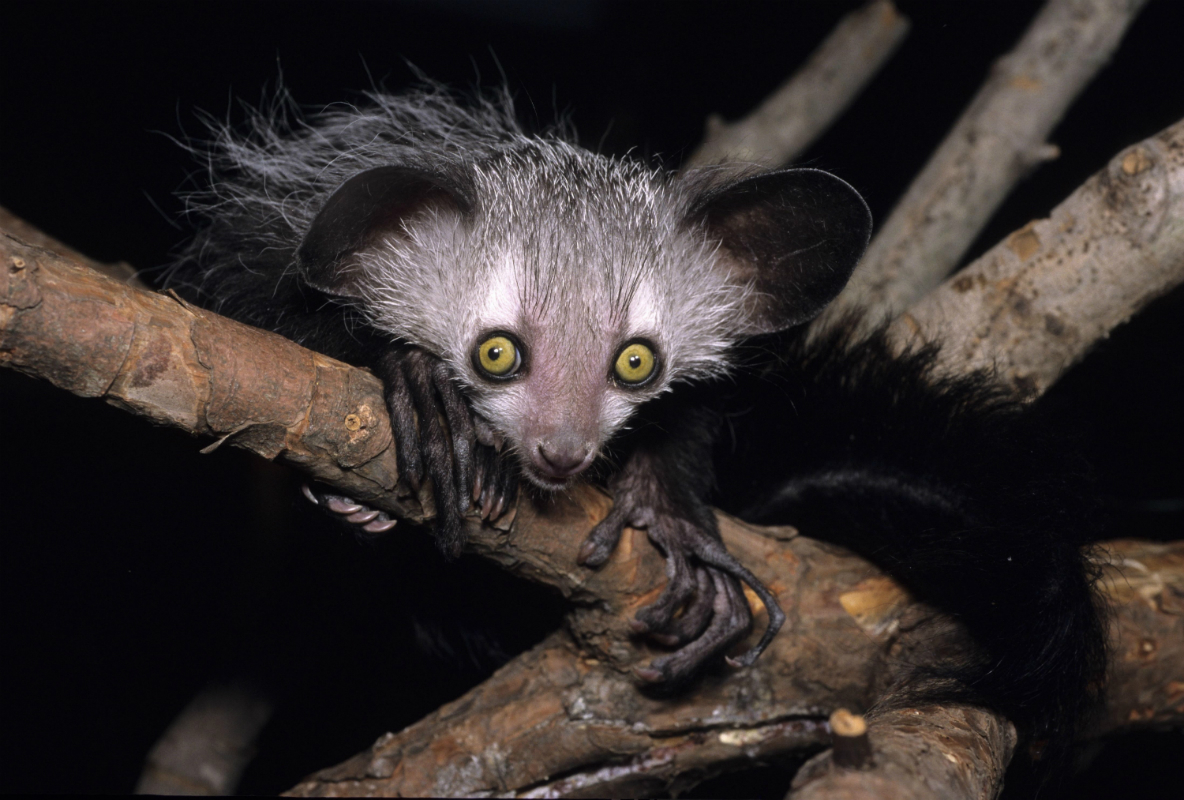Nectartini? This Little Lemur Has a Taste for Alcohol

Researchers have found that a species of nocturnal lemur sips on fermented nectar, and this little creature prefers its drinks strong.
In fact, the new study suggests that the taste for alcohol may be more widespread in the primate lineage than scientists previously thought, and may be linked to genetic factors that shaped the diets of early humans. [8 Humanlike Behaviors of Primates]
Scientists had already discovered a gene mutation in both humans and African great apes that enables the speedy digestion of alcohol; this was likely an adaptation that evolved to accommodate fermented foods in our ancestors' diets.
Now, researchers have investigated another species, called the aye-aye, that bears the same mutation, known as A294V.
Probing for nectar
In the new study, the researchers wanted to investigate whether alcohol was part of the aye-ayes' regular diet. Aye-ayes are nocturnal lemurs native to Madagascar. They're known for their exceptionally elongated finger that they use to find and extract beetle larvae from wood.
But aye-ayes also use this finger to probe for nectar in a plant called the traveler's tree, also native to Madagascar. Previous observations of aye-ayes showed that they spend as much as 20 percent of their feeding time during the rainy season searching for and devouring the liquid treat.
The authors of the new study suggested that a portion of the nectar that aye-ayes consume may be fermented, which would mean that the aye-ayes are imbibing alcohol seasonally, and in notable quantities.
Get the world’s most fascinating discoveries delivered straight to your inbox.
To find out whether aye-ayes do, in fact, have a taste for alcohol, the researchers tested two of the long-fingered primates at the Duke Lemur Center in North Carolina. They offered the aye-ayes servings of tap water alongside sucrose solutions with varying amounts of ethanol (alcohol). This simulated the alcohol content that aye-ayes might encounter in fermented nectar — no more than 5 percent.
The scientists discovered that the aye-ayes could tell the difference between the quantities of alcohol in the solutions. Moreover, the primates showed a distinct preference for the solution that had the highest concentration of alcohol: They probed the containers after they emptied them, hoping to detect one more tasty drop.
Only in it for the sugar
But the aye-ayes weren't out to get hammered, according to study co-author Nathaniel Dominy, a professor of anthropology and biological sciences at Dartmouth College.
Rather, for the aye-ayes, alcohol is simply a better source of energy, Dominy said.
"For aye-ayes and other primates, the main advantage of any fermented food is that it has more calories than the equivalent unfermented food," Dominy told Live Science in an email. "Gram for gram, alcohol has about twice the calories as sugar."
The study's findings show that, in primates, there is likely a link between the presence of the A294V gene mutation, which allows for faster alcohol digestion, and an affinity for alcohol's taste, the researchers said in the study.
And because humans share the A294V mutation with chimpanzees and gorillas, our last common ancestor must have carried this mutation as well, Dominy said. That means the genetic makeup for appreciating alcohol was in place before the modern human lineage emerged, he added.
"This ape ancestor lived about 10 million years ago," Dominy told Live Science. "It stands to reason that fermented foods were a part of its diet, and that is why the A294V mutation conferred a selective advantage."
"So, we humans were adapted to consume alcohol long before we ever figured out how to make it on purpose," he said.
The findings were published online July 20 in the journal Royal Society Open Science.
Original article on Live Science.

Mindy Weisberger is a science journalist and author of "Rise of the Zombie Bugs: The Surprising Science of Parasitic Mind-Control" (Hopkins Press). She formerly edited for Scholastic and was a channel editor and senior writer for Live Science. She has reported on general science, covering climate change, paleontology, biology and space. Mindy studied film at Columbia University; prior to LS, she produced, wrote and directed media for the American Museum of Natural History in NYC. Her videos about dinosaurs, astrophysics, biodiversity and evolution appear in museums and science centers worldwide, earning awards such as the CINE Golden Eagle and the Communicator Award of Excellence. Her writing has also appeared in Scientific American, The Washington Post, How It Works Magazine and CNN.


